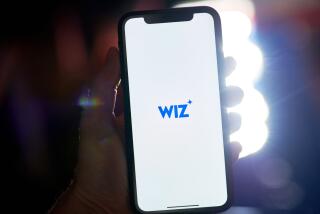Microsoft, U.S. Near Agreement
- Share via
The Justice Department has reached a tentative settlement to end its 3-year-old antitrust lawsuit against Microsoft Corp. and is trying to persuade the 18 states that joined the case to agree to the same terms, people briefed on the talks said late Wednesday.
The draft agreement was circulating among the states, but no consensus has emerged yet, the sources said. Some of the states agree with Microsoft competitors that believe the Justice Department is settling for too little, but others are likely to follow the Justice Department’s lead.
“The states are trying to figure out what to do with it,” said one lobbyist for a Microsoft competitor. “They’re all over the map.”
The deal, which could still fall apart over details, would force the world’s largest software company to open up parts of its Windows operating system to make it easier for other companies’ programs to run as well as Microsoft products, sources said.
Computer makers, which have been struggling with falling sales, also will have more control over how the machines are configured, they said.
But other areas may not be addressed, including concerns about the new Windows XP operating system, which includes new features in areas that Microsoft has yet to win a majority market share.
The Justice Department and a spokesman for the states declined to comment. Microsoft spokesman Vivek Varma said only that the Redmond, Wash.-based company was working hard to achieve a final agreement.
The states “are looking very closely at this,” a representative of one of the states said. “Nobody’s about to dance in the streets.”
U.S. District Judge Colleen Kollar-Kotelly had given Microsoft and government attorneys until Friday to work out a deal or face a trial next year on how the company should be punished for violating monopoly laws. If no deal is reached by Friday, the sides may ask for an extension.
The states could continue to push for a trial. They also could challenge the agreement in court as inappropriate, given the seriousness of the charges.
Microsoft’s competitors, including AOL Time Warner Inc., Sun Microsystems Inc. and Oracle Corp., also could initiate suits, bolstered by the court’s findings that Microsoft broke the law by strong-arming computer companies to the disadvantage of rivals such as Netscape Communications, now part of AOL.
Technology companies that have been briefed on the proposed settlement blasted the terms, saying they are far too weak.
“‘It’s a complete sellout,” said one executive who spoke on condition of anonymity. “We don’t see anything in there that is remotely responsive to the Court of Appeals decision. It does nothing to fence in Microsoft’s anti-competitive behavior.”
He predicted several large states would oppose the agreement, including California and New York.
For several weeks, Microsoft opponents have been nervous about the ongoing settlement talks. They feared that Assistant U.S. Atty. Charles James, who has expressed a desire to wrap up the case quickly, might agree to terms that were too soft.
Some opponents said Wednesday that they already were planning to challenge the settlement, if finalized, at a so-called Tunney Act hearing. Such proceedings are required to ensure settlements meet the public interest.
The states have taken a harder line than the federal government at earlier points in the case, and last month they hired their own trial lawyer, Brendan Sullivan, to prepare for new proceeding. The states were left out of the last round of talks, sources said.
In September, the attorneys general of New York and California said they would insist on changes to Windows XP. They said they might seek restrictions beyond those being weighed by the Justice Department.
Windows XP includes digital photography tools, instant-messaging functions, the Passport Internet commerce service, a music and video player and a Web-based audio communications system.
The Justice Department had said it would investigate XP but it would seek remedies modeled on the first judge’s proposed temporary conduct restrictions.
Those remedies included allowing computer makers to modify the desktop appearance of Windows systems and forbidding Microsoft to reward manufacturers that exclude the company’s competitors.
Some states have said they also wanted to make sure that Microsoft ships versions of its flagship products without the add-ons or at least allows computer companies to disable those features if they want.
Still ahead are fierce debates over many fine points in the draft settlement. In 1995, Microsoft negotiated wording into that year’s consent decree that allowed it to escape most controls over its actions.
Kollar-Kotelly inherited the current case after the previous judge was disqualified for speaking to reporters before ruling that Microsoft should be split in two.
After that remedy was sent back for reconsideration, the new Bush administration’s Justice Department said it would no longer seek a breakup, and the states reluctantly followed Justice’s lead.
*
Times staff writer Edmund Sanders contributed to this report.
More to Read
Inside the business of entertainment
The Wide Shot brings you news, analysis and insights on everything from streaming wars to production — and what it all means for the future.
You may occasionally receive promotional content from the Los Angeles Times.










